The Marines Have Landed! Shores of Tripoli Reviewed
By Mitch Reed
Kickstarter has been a blessing to the gaming community. So many great games now have a path to our tables from small developers unlike any other time in our hobby. One such game is The Shores of Tripoli by located in Washington DC. Fort Circle is run by avid Nationals fan Kevin Bertram who has a steady social media presence on many gaming threads.
The Shores of Tripoli (SoT) looks at the Barbary Wars fought between the United States and the Barbary Pirates from 1801 until 1805. The game faithfully recreates this conflict with a fun and easy to play game that history buffs and seasoned grognards will both enjoy.
The History Lesson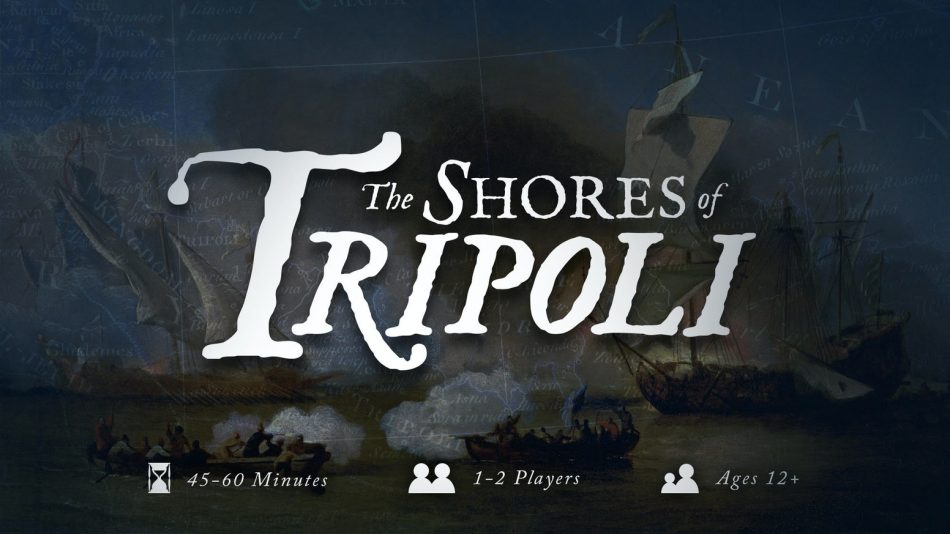
Other than the line the USMC song and reading the book years ago I knew little about the period the game covers however this did not stop me from backing the game on Kickstarter in late 2019. I quickly saw that this was a well-researched game that covers a topic that is not gamed very often. Even if you know the history, the game comes with detailed designer’s notes and a letter from President Thomas Jefferson to the leader of the pirates that will get you up to speed on the historical background.
Mechanics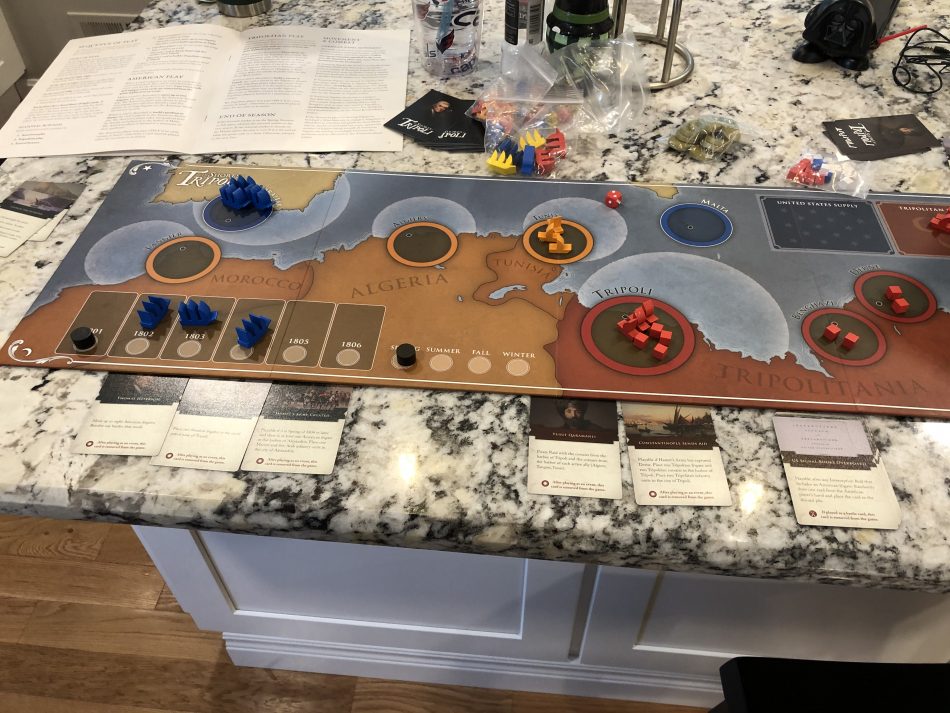
The game uses a card-based mechanic with each player having a unique set of cards to play during a turn. The cards represent historical events that you can play as written or use them to build resources or move your forces on the game board.
I know a lot of gamers dislike the card mechanic, and at one point I did as well. However, over the last few years, I feel that games that use this mechanic give the player a more accurate feel of the history behind the game. SoT does not disappoint in this manner, and the cards really become the heart of the game. They give the player many options during each round of play.
Some of the event cards can only be played at certain turns of the game. Most often, once you play the event the card is removed from play. Many of the cards allow the player to grow, move, or attack with your forces. This means you do not have always need to exchange a card to execute your battle plans.
The combat and movement mechanics in the game are intuitive and the rule book is only 12 pages long. The game also comes with cards and rules to play solo, which many gamers like. Combat can occur on the sea between ships or by bombarding an enemy location or conducting a raid. Assaults use ground forces and flip control of the many locations of the game.
The Game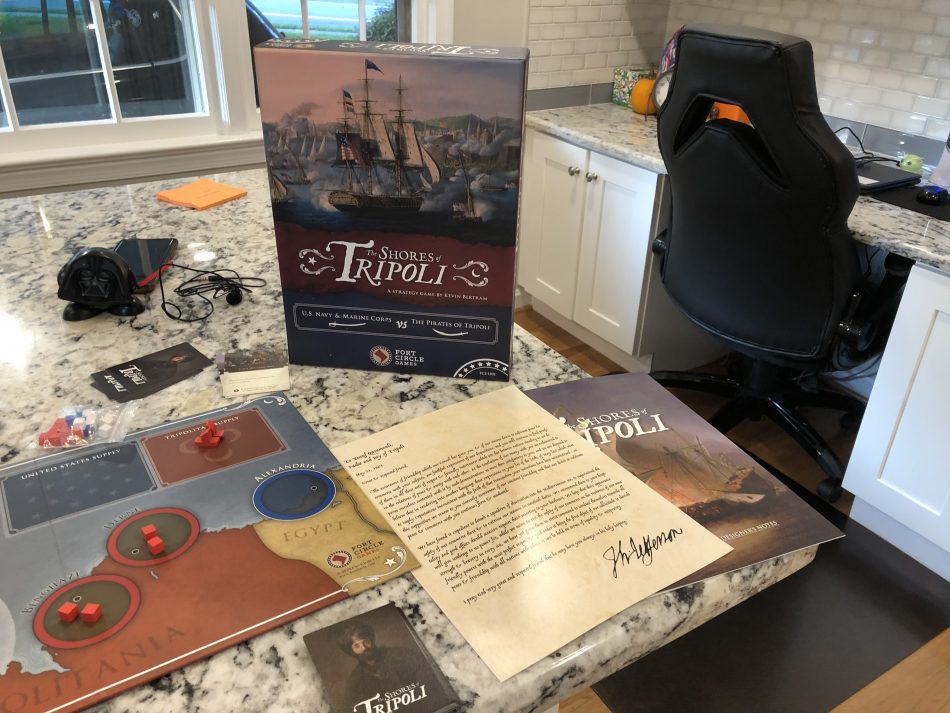
The objectives of SoT are simple. The US player either captures Tripoli (“Assault on Tripoli” card in 1805) or forces the Barbary states into signing the peace treaty (“Treaty of Peace and Amity” card in 1805).
The Tripolitan player can win by making the cost of achieving victory too high for the young US government by eliminating their ships and armies on the table or by gaining enough gold from their raids.
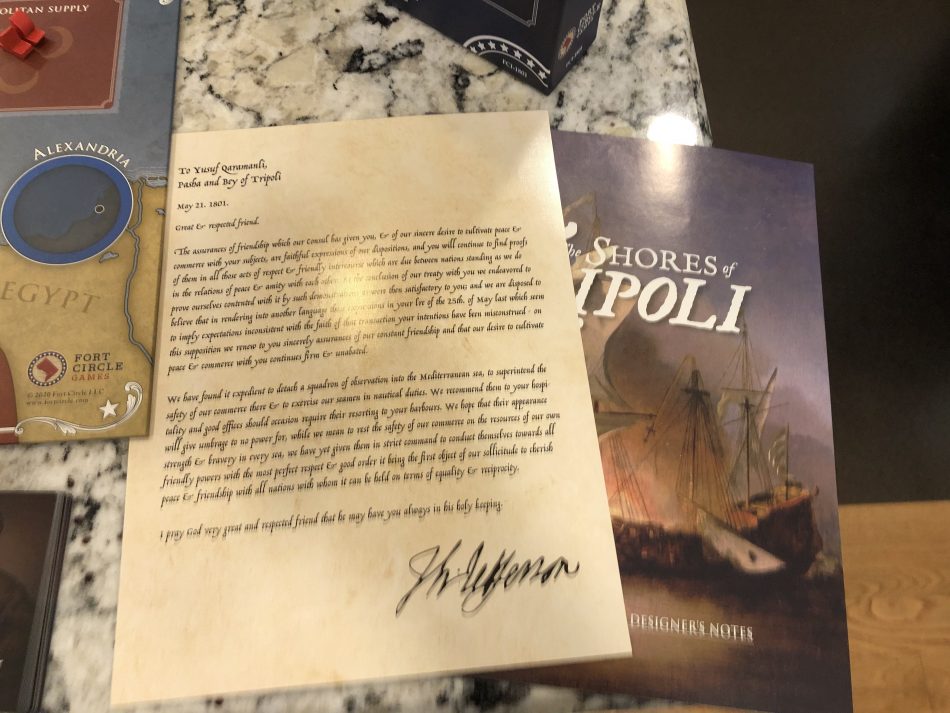
Each turn is a year consisting of rounds that are represented by seasons. Each season a player plays a card from their hand and once four seasonal rounds have been played the game moves onto the next year and the players can re-fill their hand of cards.
If a player moves their ships into a port with enemy ships, combat then takes place during that season. In my play of the game, I found that I did not combat the enemy as much as I put my force in a position to combat in a later round. I really liked this mechanic and it causes a player to really think about how each move sets up their victory later in the game. With so many courses of action available each turn the replayability of this game makes it one that you will not grow tired of at all.
The Components
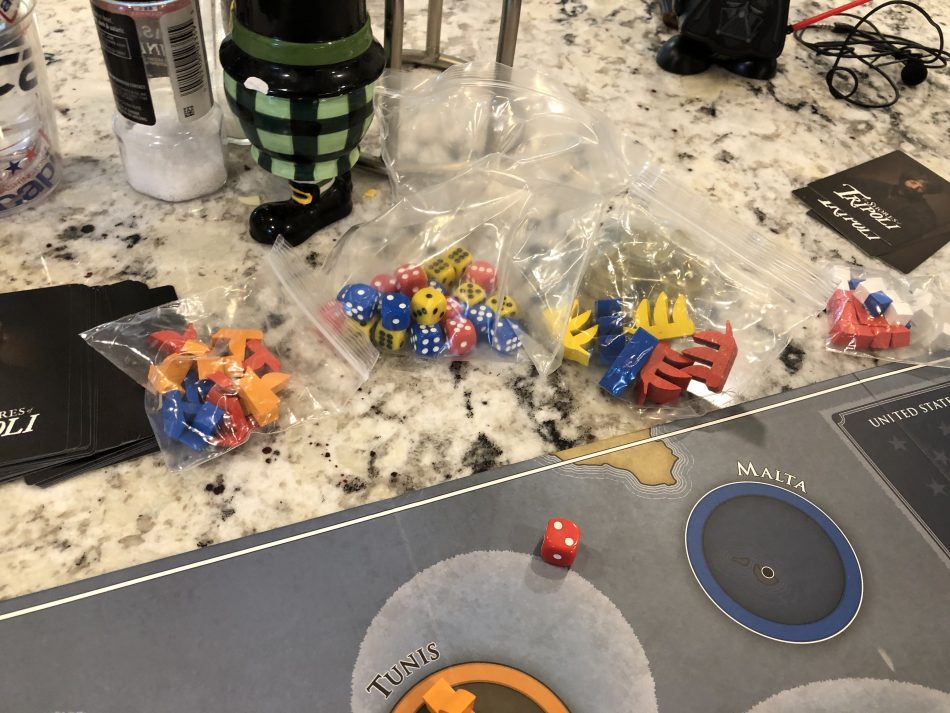
The game’s tokens, representing ships, troops, gold, as well as markers, are made of colored wood which gives it a nice old school feel. The game map, while not huge, is full of color and comes on a nice hardback board that is easy to read. The cards have quality artwork with a nice linen finish.
To top this all off the game comes with a rule book, a history/developers guide, the letter from President Jefferson, and 24 multi-colored dice. The quality of this product is higher than I expected from a small game developer on their first game.
Fort Circle Games
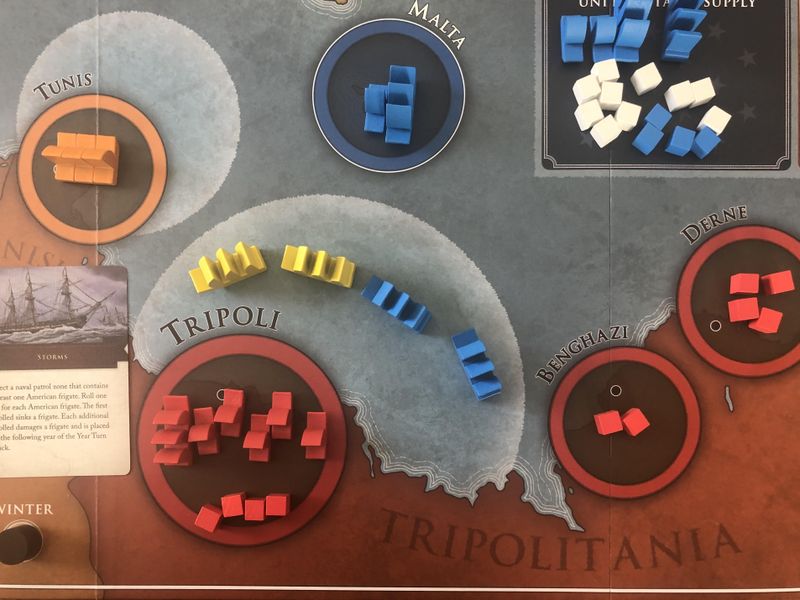
Fort Circle is a small game company with one game out on the market (SoT) and one that just wrapped up its Kickstarter called ‘Votes for Women” which covers the American Suffrage movement, and yes I also backed it. It looks like Kevin and Fort Circle are focusing on historical gaming on topics that are not widely gamed. This is evident also by what they have stated in their ‘about” section on their website;
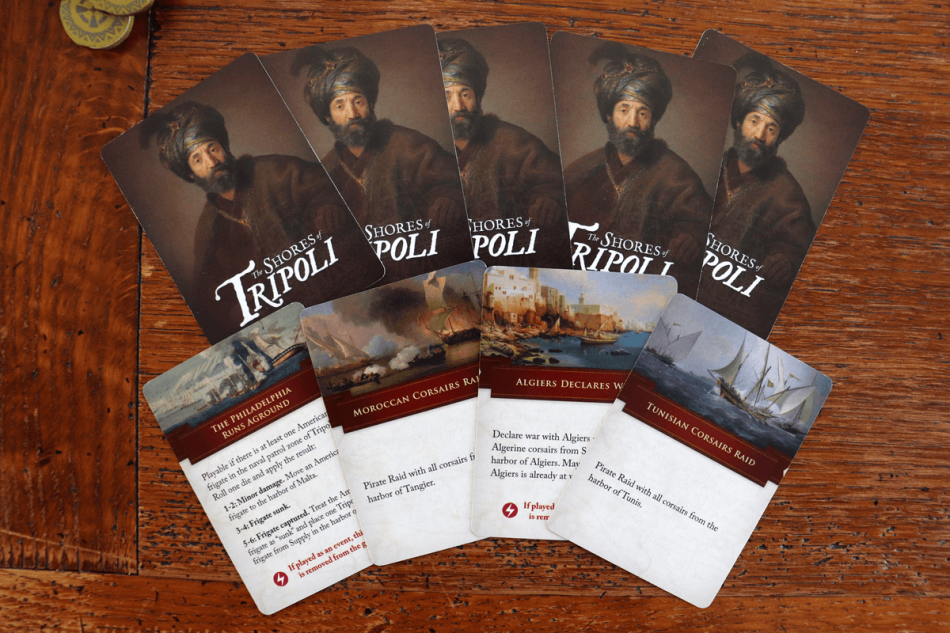
“Fort Circle Games was founded in 2017 to develop and publish beautiful board games that are grounded in historical events. Fort Circle games are designed to be approachable and easy to learn for novice gamers and students – but also challenging enough to encourage repeat play. Fort Circle Games is proudly based in Washington, DC, and was named after the network of fortifications that defended the city during the Civil War.”
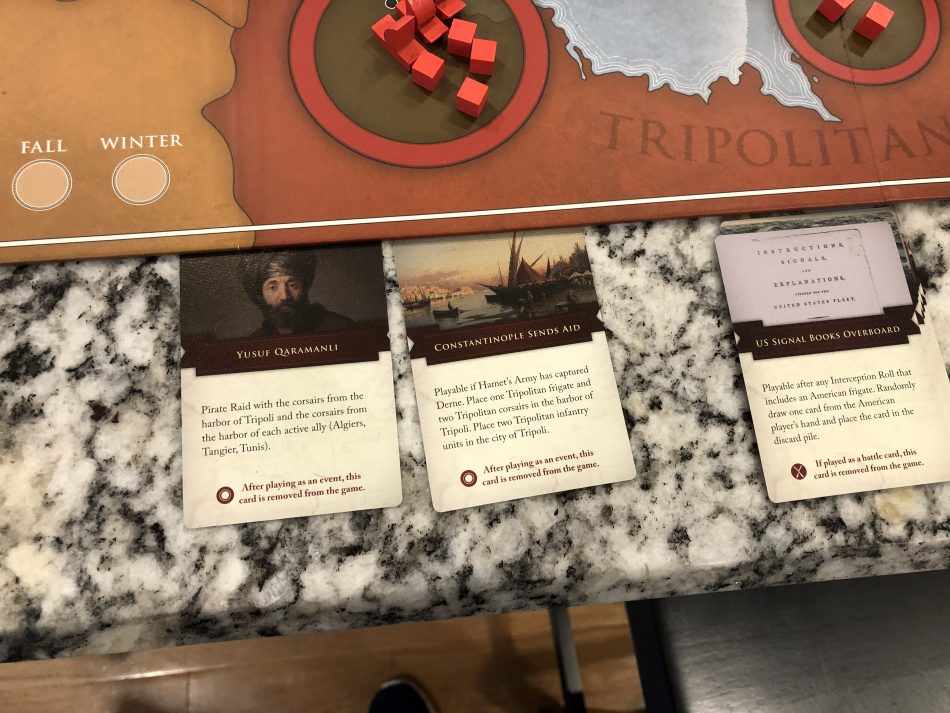
I love this approach and I also like the fact they are creating games with innovative mechanics which just makes me want to see what their future plans are all about and Kevin sent me the following;
- United States v. Aaron Burr, by Jason Matthews, on the treason trial of Aaron Burr, early 2021 Kickstarter, shipping in 2021
- First Monday in October, by Talia Rosen, on the history and evolution of the Supreme Court, early 2021 Kickstarter, shipping in 2021
- The Halls of Montezuma, by Kevin Bertram and Gilberto Lopez, on the Mexican-American War, a companion game to The Shores of Tripoli, 2021 or 2022.
Overall Review
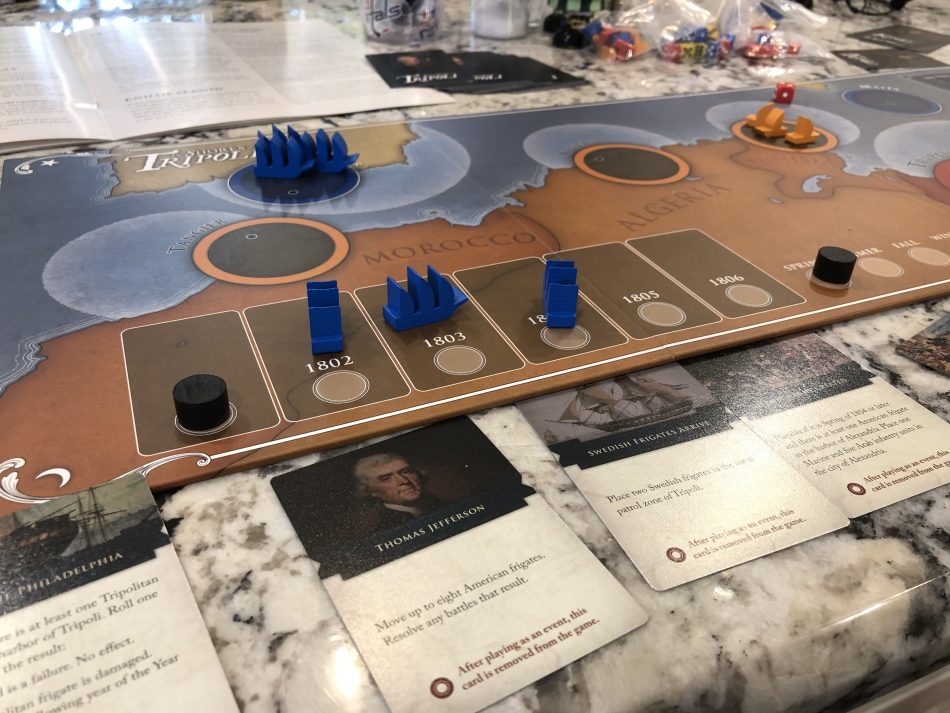
In addition to purchasing this game to support a local developer, I found the subject manner unique and interesting. Having played the game a few times I have become a fan. The mechanics work well, and not only teaches about the Barbary Wars but can also show non-gamers what wargaming is all about. I recommend picking this great game up.
